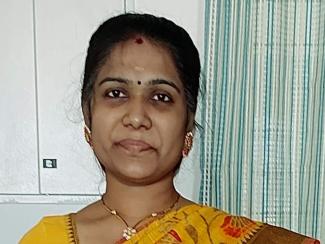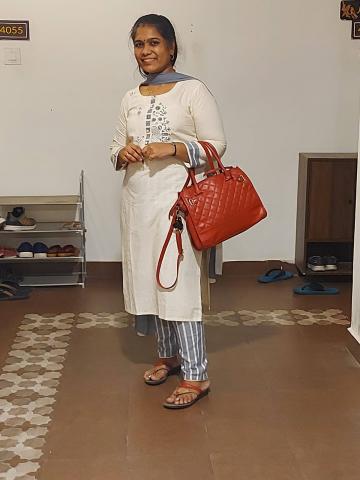
Shailaja Buvaneswari S,38 suffered a stroke during her second pregnancy, a sudden attack without any warnings, whatsoever. She talks about how she slowly recovered and got back her strength to look after her children and family.
Please tell us a bit about your condition:
I had a TIA (Transient Ischemic Attack) during my 27th week of pregnancy (second). I was thrombolysed and the baby was monitored for the next one week while I was given mild physiotherapy in the hospital. I was discharged after a week and I was able to walk with weakness in my left arm. I underwent 10 sessions of physiotherapy at home, to regain my balance and was able to take care of myself. I underwent a planned C-section and delivered a healthy baby girl during the 42nd week. I was on Heparin Injections for three weeks post-surgery and then was able to take care of the baby and the household along with my elder daughter who was 5 years old at that time.
When and how were you diagnosed?
I had a very normal day at office that day and made dinner at home. I sensed a throbbing headache at midnight after which I had uncontrollable nausea and I was thrombolysed within 5 hours. My husband and my elder daughter were present and they thought it was my regular migraine headache. They later understood that it’s not so as I was even unable to get up to take a painkiller. Considering that I was pregnant, my husband immediately called for an ambulance, where the paramedic administered a medicine to arrest the nausea first. I was conscious throughout the journey and when I entered the emergency, the neurology doctors and consultants were already present to take an MRI scan. They diagnosed that I had a Transient Ischemic Attack and consulted my Ob-gyn who was actually traveling for her personal work and she advised the team about the medications and procedures to be followed. They administered thrombolytic plasminogen activator and monitored me for the next 48 hours after dissolving the blood clot. There were a few tests taken to identify the cause. But all my tests came out fine, ruling out the usual causes.
Related: Listen to Dr. Bhushan Joshi talk about Stroke in women, especially during pregnancy
It must have been very tough for you, considering you were pregnant at the time of your attack. Please describe your experience of managing the condition?
By the time of delivery, I had managed to master the gross motor skills where I could lift things, walk and even climb stairs with good balance. It was the fine motor skills which was a problem. I was even able to cook, hang dry clothes and fold clothes and blankets. I took care of the baby whole time starting from giving a massage, bathe and feed the baby along with taking care of my elder kid. I had of course my mother and husband to help out with many household chores. I took help from apps for deliveries of vegetables and groceries and had a maid to help clean the dishes and the house daily. It was tough but I had the help needed and whenever I was down emotionally, I would pull myself up thinking that I’m at least physically around for my daughters while many impacted had not been that lucky to be diagnosed early and treated promptly.
What medications are you on?
Multivitamin supplements (optional), blood thinner, painkillers during pain if any.
Were there any side-effects of the medicines?
Not as yet, although I am
aware of rumours about the side effects of taking blood thinners for a long time. Currently, I avoid taking pain killers and resort to taking rest or therapy in case of pain.
What was your treatment pattern? Besides medication, how else did you heal?
Taking mild physiotherapy, doing household chores, being positive all helped me heal slowly. I also practiced yoga and did a lot of walking.
How difficult was it to deliver a child after stroke? Could you manage to tend to your child in the early days?
It was difficult. Necessity was there, I had to help myself. I was quite confident that I can handle the newborn given my experience with my older child. You fear what you don’t know. I too care and even gave a bath three days after my surgery to my baby. I was two-month post stroke so most of my forearm function had regained and my fine motor skills were lagging. So, I used my dominant hand for many activities.
What were the other challenges you faced and what is your advice to patients who face similar challenges?
Challenges were there in most of the situations starting from applying tooth paste in toothbrush to trying to hold your milk cup before dinner. My advice would be to take it slow, surround yourself with positive people and just let go of the current situation. We will be better every day and only we can realize it. We need to start appreciating ourselves for our smallest improvement. We had a downfall for a reason, recovered for a purpose and to fulfil that purpose we should just focus on ourselves. At least for a brain injury not even your best buddy can understand what is wrong with you. It is such a complicated situation and focusing on one thing at a time can help heal. Sleeping and keeping yourself busy can help to a great extent.
Have you learnt anything in managing your condition that you wish you knew before?
Actually, it came as a shock because I had a healthy lifestyle with no comorbidities. So it was a wakeup call to actually realize how marvellous being normal was.
What kind of specialists do you consult and how often?
I had all the routine tests conducted pre- and post-delivery after which my neurologist told me that I am fine and that there was no need to visit. However, I do consult him in case of vaccination or tooth extraction. Fortunately, I haven’t been really sick after I have had my stroke, no high fever episodes or infections, so far so good.
Have you had to make some changes to your lifestyle because of your condition?
I always plan ahead, one of my best practices, try understanding the place of visit to avoid any sudden shocker with respect to heights or anything that can cause balance issues. I seek help if I need to which I rarely did pre-stroke and say no to many things that can be avoided to just avoid unwanted stress.
Have you tried complementary therapies like yoga or alternative therapies like homeopathy?
I am practicing yoga, which is really helpful to regain balance, play badminton, no medications otherwise.

Has it been difficult emotionally to cope with your condition?
I’ve had so many breakdowns and sleepless nights, but I had to conserve my strength for my daughters. Sometimes I really become callous and insensitive to comments by people just to concentrate on the work in hand. There are days where my brain wants to just shut down and not do anything. I take that break. I know my buddies may see me as a burden on those days, but I really don’t care. I need the break to get back my strength. I think just letting the low moment pass and not reacting is the magic of recovery in stroke.
How has your family supported you?
Enormously. My husband and my elder daughter supported me, believed in me and I attribute my recovery and my younger daughter’s growth to their support. My parents gave me the necessary moral support and all my relatives and neighbours were also supportive. My doctors especially my ob-gyn Dr.Wahidha Suresh has been a pillar of support and my neurologist Dr.Shanmugasundaram has guided me very well through this recovery process. I extend my sincere thanks to my physiotherapist, pediatrician and even the nurses who attended me. They were really positive and it helped me along in my recovery process.
Is there any personal anecdote that you would like to share with us?
After stroke, one may have to start from zero level in your life but this experience and the learnings from these experiences have definitely made me a better person. I reflect on how I had taken my physical and mental self for granted until then. It made me realize that there is a purpose for my life and work towards it without expecting anything in return. It made me realize my mind power over my physical strength and that a person’s will-power can do wonders in their life. I recently joined these support groups and literally connected with each and every one of the groups which made me understand that I am not alone. Their experiences have helped me to live life and strive towards perfection each day.
As told to Moyna Sen
Issued as part of the public education series by Boehringer Ingelheim India and PatientsEngage






